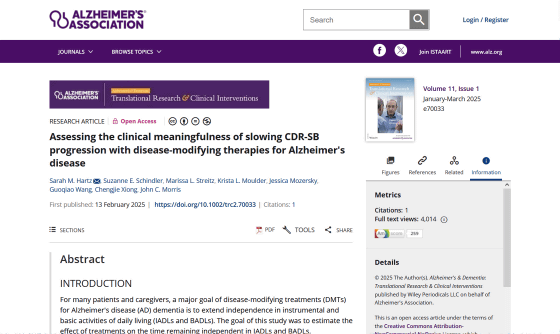How much longer can Alzheimer's medication help people live independently?

Assessing the clinical meaningfulness of slowing CDR‐SB progression with disease‐modifying therapies for Alzheimer's disease - Hartz - 2025 - Alzheimer's & Dementia: Translational Research & Clinical Interventions - Wiley Online Library
https://alz-journals.onlinelibrary.wiley.com/doi/10.1002/trc2.70033

Next-gen Alzheimer's drugs extend independent living by months – WashU Medicine
https://medicine.washu.edu/news/next-gen-alzheimers-drugs-extend-independent-living-by-months/
Latest Alzheimer's Drugs Can Add Years of Independence to Patient Lives : ScienceAlert
https://www.sciencealert.com/latest-alzheimers-drugs-can-add-years-of-independence-to-patient-lives
The U.S. Food and Drug Administration (FDA) approved lecanemab in 2023 and donanemab in 2024 , both of which are recently approved treatments.
Both lecanemab and donanemab are drugs that work by removing amyloid beta from the brain, which is thought to be linked to Alzheimer's disease, and their approval was met with great cheers from some Alzheimer's disease researchers.
However, despite the FDA's approval based on the results of clinical trials, some Alzheimer's patients said they found it difficult to understand the effects of the drug. According to doctors treating them, patients found it difficult to understand how the clinical trial results of 'reducing the rate of cognitive decline' would affect their own lives.
Treatment with lecanemab and donanemab is expensive, requires weekly or monthly infusions, and can cause side effects such as cerebral edema, so patients may be hesitant to start treatment if the benefits are unclear.
In order to more clearly quantify the effectiveness of lecanemab and donanemab, a research team from the University of Washington School of Medicine in the United States conducted a study to estimate 'how much longer people can live independently if they take the drugs.'

'What we were trying to do was find a way to provide patients with information that was meaningful to them and help them make decisions about their care,' said
The study looked at two key points at which Alzheimer's patients begin to decline: when they lose the ability to manage everyday tasks such as cooking, driving, paying bills and remembering schedules and become unable to live independently; and when they become unable to care for themselves and require assistance with bathing, dressing and toileting.
The research team looked at 282 Alzheimer's patients enrolled at the Knight Alzheimer Disease Research Center, an Alzheimer's disease research center run by the University of Washington, and calculated how long it took for them to lose their independence or reach the point where they needed care if they were left untreated or if they were treated with lecanemab or donanemab.

Patients with very mild symptoms at the start of treatment were able to live independently for 29 months without treatment, with the ability to manage everyday tasks such as cooking, driving, paying bills and remembering appointments. The calculations showed that treatment with donanemab extended this to 37 months, while treatment with lecanemab extended this to 39 months.
On the other hand, patients with mild symptoms at the start of treatment, unlike those with very mild symptoms, lost the ability to manage everyday tasks such as cooking, driving, paying bills, and remembering schedules from the beginning, and already lost their independence. When the time until they needed nursing care for these patients was investigated, those treated with donanemab were 19 months longer than those treated with lecanemab, which was 26 months longer.
'The goal of this study is not to advocate for or against these drugs. The goal of this paper is to put the effects of these drugs into context and help people make the best decisions for themselves and their families,' Hertz said.
Related Posts:
in Science, Posted by log1h_ik







